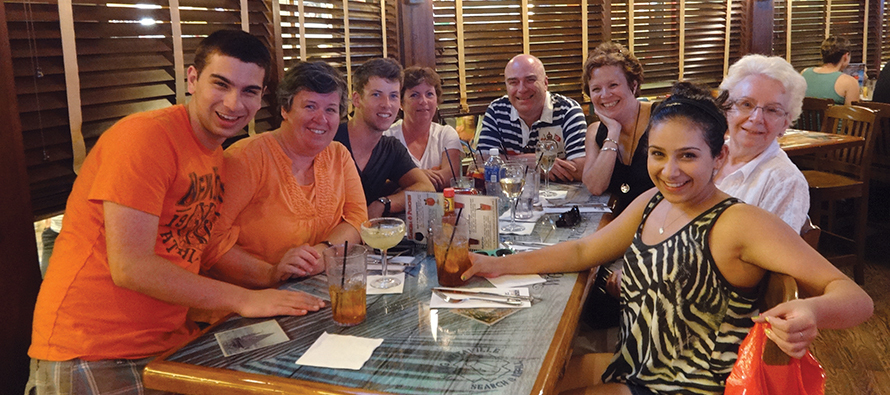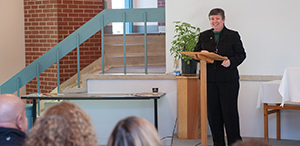Can your body be sacred in the age of twerking?

Image: Sister Susan Kidd, C.N.D. (second from left), enjoying time with her family, knows that support from others is an important part of living her vows.
I AM FORTUNATE enough to have a steady stream of university students through my office, and the day I heard from VISION about this article was no different. “Can your body be sacred in the age of twerking?” the editors asked. So I asked the students. I was not ready for their response: silence, an exchange of glances between them, and then a giggling shy look in my direction.
That was not normal. There is often a buzz of chatter in my office, usually accompanied by laughter and on some days with an equal balance of tears; some conversations have both! I am a campus minister, hired by the Catholic Church to work on a secular university campus. The people through my office vary from day to day and include students, staff, and faculty. This day, this question caused the audience to pause. But it shouldn’t have.
We were created to care for creation
I am here to tell you that the answer to the question is a clear and resounding “yes!” Despite the relentless media messages that leave us with the impression that there are no boundaries, protections, or sense of sanctity left when it comes to our bodies, the reality is that we feel whole and true to ourselves when we care for our bodies. That is because we are created in God’s image and likeness. We are blessed with duties and responsibilities to be good stewards of all creation, including ourselves—our minds, hearts, and bodies.
Our rich Catholic teachings on chastity and integrating the powers of life and love are meant to free us to be our best selves. Being chaste is about being in right relationship and healthy relationships. But sometimes we focus too much on relationships with others and with the environment at the expense of our relationship with ourselves and God. The “great commandment” (Matthew 22:37-38)—to love God with all our heart, souls, and minds—reminds us that focusing on our personal relationship with God above all others is not being selfish. It is being faithful.
Pressured to choose poorly
I believe it is easier for me as a religious sister to live chastely than for those who have not yet made a life choice. I have my public commitment, my congregation, prayer, community, ministry, and the other vows supporting me. Those considering religious life have many external pressures luring them toward options that are not life-giving. But that is not to say that the pressures are insurmountable. We must constantly call ourselves back to our purpose: which is to live in the joy of Christ. It’s difficult to see where twerking fits in to that plan.
Yet that is not to say that using your body in expressive ways is bad. When the African students who come through my office are happy, they sing and dance with thrusting hips! They are quick to hug and touch. This reflects a healthy sense of sexuality and of self. Embracing, dancing, rhythmic and meditative movement, and exercise can model healthy living. And all are in keeping with our Catholic tradition of celebrating our flesh-and-blood humanity.
| Kidd speaks during a function at the university Chaplaincy Center, where she serves. |
Lessons in sanctity
The sanctity of the human body is both caught and taught. We need more occasions to discuss such important topics among peers and family members. In this fast age of social media, it takes but one careless decision to change someone’s reputation for a very long time.
Recently with my permission my students added SnapChat to my phone. Now I receive pictures from them—“clean fun” my mother would call it. But I can see how this technology could be used differently given other people and other choices—sexting and cyber-bullying to name but a few examples. We need to treasure the gift of human sexuality and not denigrate it or ourselves.
Our flesh-and-blood God
It is through God’s great act of love that Jesus became human. At the Eucharist we are invited to remember the incarnation with all of our senses: We take and eat God’s body and blood. What an intimate sign of union, intimacy, and the inner unity of body and spirit. Jesus is wholly present in us. That’s sanctity of the body!
We are the vessels God chose to carry on the message of Incarnation to the ends of the earth. And yet we carry this message in clay pots (2 Corinthians 4:7). It is up to all of us—from athletes to idols, to teachers, parents, friends, and family—to promote positive body images of men and women and a healthy understanding of our sexuality and sanctity. We can start by treating our bodies and the bodies of others with due respect.
Tags
Related
- Questions Catholics Ask
- What Catholics believe about the Eucharist
- How Jesus embraced his call
- Prayer: Our never-ending conversation with God
- What the church is teaching—and learning—about the sin of racism
- Church defined: Jesus calls; we respond
- A Creed to believe in
- On whose authority?
- Ten great things about being Catholic
- Following Jesus: Be ready for some surprises Read More
Most Viewed
- Find your spirituality type quiz
- Questions and answers about religious vocations
- Celibacy quiz: Could I be a nun? Could I be a brother? Could I be a priest?
- Resources for older discerners or those with physical and developmental differences
- About Vocation Network and VISION Guide



 Sister Susan Kidd, C.N.D. is a Congregation of Notre Dame Sister. She has served as vocation director for English Canada, was a missionary in Cameroon, and now works at the University of Prince Edward Island in Atlantic Canada as a campus minister.
Sister Susan Kidd, C.N.D. is a Congregation of Notre Dame Sister. She has served as vocation director for English Canada, was a missionary in Cameroon, and now works at the University of Prince Edward Island in Atlantic Canada as a campus minister.